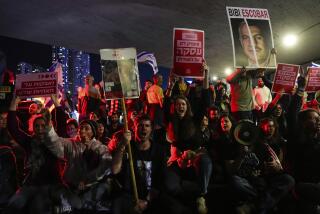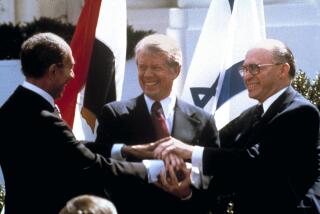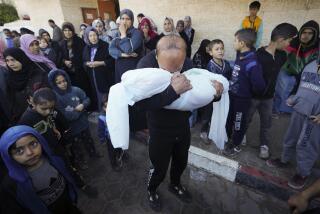Islamic State’s beheadings of Egyptians could draw West back into Libya
For nearly four years, the West has largely stayed on the sidelines as Libya descended into post-revolution chaos. Now the bloody beheadings of a group of Egyptian Christians at the hands of Islamic State could draw the international community back into the densely complex tangle of fighting in the oil-rich North African nation.
Egypt, seeking retribution for the cruelly cinematic execution of 21 Coptic men who had gone to Libya to work as laborers, carried out at least two waves of airstrikes Monday in neighboring Libya. The warplanes targeted what Egypt said were training camps and weapons caches belonging to a Libyan offshoot of Islamic State, which in recent months has made inroads in several parts of the country, seizing on the power vacuum left by the chaotic but so far inconclusive struggle among an array of competing militias.
At the same time, Egypt launched a diplomatic offensive, describing the Sunni Muslim militant group and its allied armed groups in Libya as a universal threat that must be confronted forcefully — and not by Egypt alone. It would be a double standard, a Foreign Ministry spokesman argued, for the U.S.-led military coalition to fail to take action in Libya that is just as “firm” as the airstrikes it is conducting against Islamic State in its heartland, encompassing parts of Syria and Iraq.
“Egypt is under attack,” the spokesman, Badr Abdelatty, told reporters. But the militants of Daesh, he said, referring to the group by its Arabic acronym, also pose a “direct threat to international peace and security.”
In Egypt, the full horror of the men’s executions, depicted in a graphic video released online late Sunday, was still sinking in on Monday. In the governorate of Minya, south of Cairo, many of the bereaved families were village neighbors. Relatives there wept as they clutched portraits of their dead loved ones. President Abdel Fattah Sisi hurried to Cairo’s main Coptic cathedral to offer condolences, and dispatched senior officials to attend funerary prayers in Minya.
If Egypt’s military reaction was swift, its diplomatic one was equally so. Egyptian Foreign Minister Sameh Shoukry, en route to New York, was given marching orders to appeal to the U.N. Security Council to act against Islamic State. Sisi also conferred by phone with France’s president, Italy’s prime minister, Russia’s foreign minister and Secretary of State John F. Kerry, the Foreign Ministry said.
Islamic State’s message appeared in some ways designed to galvanize a European response. In the video, staged on a Mediterranean beach outside the Libyan capital of Tripoli, the lead executioner referred boastfully to the group’s foothold less than 500 miles from the shores of Europe and the symbolic center of Christianity, gleefully describing this latest killing field as “south of Rome.”
In Italy, the onetime colonial power in Libya, officials cited by the Associated Press said they would weigh taking part in any military intervention if one were decided upon, but that diplomacy should come first.
Italy has already borne the brunt of a massive wave of human trafficking originating in Libya, which at this point is essentially ungoverned despite having two competing governments. Thousands of would-be migrants, many of them seeking to escape the Syrian war, have died trying to make the perilous crossing to Italy.
In Libya, where the situation was dire even before Islamic State began making inroads, fighters swearing allegiance to the group have seized at least partial control of several cities, including the port of Derna, where Monday’s Egyptian airstrikes took place. The group is also strong in the central coastal city of Surt, where the Egyptian workers were seized in two incidents in December and January, and the Tripoli-based Islamic State affiliate claimed responsibility for a deadly attack last month on a luxury hotel in the Libyan capital.
It does not, however, control large swaths of territory in Libya, as it does in Syria and Iraq, and is far from the dominant force in the country.
Monday’s airstrikes marked Egypt’s first declared intervention in the fighting that has roiled the country since dictator Moammar Kadafi was deposed and killed in October 2011. But it has taken military measures before, including airstrikes on Islamist positions last summer, which U.S. officials said at the time were staged together with the United Arab Emirates, a close ally.
Egypt shares a 700-mile land border with Libya, much of it in forbidding desert.
As the post-“Arab Spring” regional order devolved into a struggle between Islamists and authoritarian governments like Sisi’s, Libya became a proxy battleground. Qatar, which supported Egypt’s ousted Islamist President Mohamed Morsi, has supplied Libya’s Islamists with weaponry, while Egypt and its allies have supported a former general, Khalifa Haftar, who has declared war on the Islamists based in Libya’s western city of Misurata.
But Egypt’s much-stated wish to lump all Islamists with Islamic State could doom any foreign military intervention to failure, according to some analysts. Far better than jumping in now, some argue, would be to wait and see if U.N.-brokered talks can yield some compromise between the rival governments.
Karim Mezran, a senior fellow at the Rafik Hariri Center of the Atlantic Council, said in the absence of some accord by Libya’s warring parties, any intervention would be only a thinly veiled blow on behalf of the internationally recognized government based in the eastern city of Tobruk, whose forces are battling the powerful militias based in Misurata.
“That would lead to major damage, because the faction in Misurata is very strong, so there would just be a continuation of the civil war, or war of attrition,” he said. “If an international peacekeeping force came after agreement for a national unity government, that would be much better.”
With hindsight, the last major foreign intervention is now widely viewed as ultimately helping to usher in today’s chaos in Libya. The 2011 North Atlantic Treaty Organization airstrikes that helped prevent insurgent groups from being wiped out by Kadafi’s forces were not followed up with significant international moves meant to nurture democracy. Soon after the dictator’s fall, the militias that had been nominally united in their aim of toppling him quickly turned on one another.
Egypt’s call for support from the U.S.-led anti-Islamic State coalition comes despite the notably limited role it has played to date. Despite its powerful military, and its status as the second-largest recipient of U.S. aid, it has not taken part in military action against the group in Iraq and Syria.
At the time the coalition was being assembled, Shoukry, the foreign minister, said Egypt would keep its focus on battling Islamic militants in the Sinai Peninsula. Despite being outgunned, the militants manage to periodically bloody Egyptian security forces.
Much is intertwined. One of those groups has since re-branded itself as Sinai Province, and has sworn allegiance to Islamic State. And Libyan weaponry, smuggled across the desert, has been a key factor in fueling the Sinai conflict.
Follow @LauraKingLAT on Twitter for news from the Middle East.
More to Read
Start your day right
Sign up for Essential California for news, features and recommendations from the L.A. Times and beyond in your inbox six days a week.
You may occasionally receive promotional content from the Los Angeles Times.






